- Home
- Gregory Maguire
Egg & Spoon Page 29
Egg & Spoon Read online
Page 29
“But now,” the ice-dragon continued, “this wail of human need stirs me from my winter hibernation. Every hour every day, I want, I want. Crying human voices. These sounds, in both ears, they whine, they ring. They never stop. When human voices halt their cry of want and want, then I will sleep again.”
“Why should they?” asked Anton. Cat whirled in surprise at his voice. Bolder than she’d guessed, now. “All creatures want. It’s normal.”
“The world is enough. It fills all needs. It has snow and salt, sameness and surprise, change and return. Animals manage. Spirits manage. But every year humans want louder and louder.”
Cat thought of Elena at the train track, diving for that half-eaten apple. She said, “Wanting more and wanting enough aren’t the same thing.”
“There is enough world for everyone. But everyone cries in want of more. I want nothing, just the same sleep as before.”
“No wonder you’re cranky, poor thing. You need your nap. Don’t listen to human voices,” said the witch. “Let them scream themselves hoarse. They’ll never get what they want. They never have, they never do. That’s what makes them charming. And fickle. And inventive. And maddening. Just tune them out.” She was adding it up for them all and wagging her bony finger at the hillside. “By staying awake, Žmey-Aždaja, you’re burning the Arctic winter away. The cities are flooding and the plains are baking. You aren’t helping. As the crisis gets worse, the cries will only get worse, too.”
Žmey-Aždaja said, “Even you, you come all the way here and you want, want, want. My eye doesn’t care, my ear doesn’t care. If enough ice melts, I fly free. I eat the world. You will be as dead as that human girl who was thrown onto the ice. I don’t care. Silence, soon enough.” The ice-dragon closed the eye facing them. The ocean burned.
The only daughter of Natasha Rudina and Maxim Rudin, treading the margin.
The world was made of ground-up stars, but it didn’t scorch her feet. She felt neither cold nor hot, though she wasn’t wearing so much as a blanket. She was naked as a maiden doing her spring bathing on the day of her wedding.
She wondered at the loss of her clothes. She didn’t think she needed them now. Maybe someone else who could use them had found them. She hoped there weren’t too many holes in them.
She didn’t remember that her most recent garment had been a fur robe from the wardrobe of Baba Yaga, to cover the prison tunic, apron, and leggings supplied by the prison matron. She could only think what she had worn when she was about seven, a pretty skirt with golden stripes across flourishes of green. Sun on new wheat.
She looked around her. She could almost make out buildings and cows and carriage sheds. The air was clean and keen; you could see through the invisible threads of it. Yet the buildings remained unseen. Hulking in a fog, losing proportion, orientation.
Here was the chapel with its rustic spire; here was the graveyard where her father was buried. She could see neither rusty gate nor bell tower nor gravestones. She sensed only the thump of space that implied the chapel, as if she’d indicated it with her hands, describing it to someone. “See, the chapel was here, and over here, the three better homes in the village, the ones that were sometimes painted, and here, the train track ran through the village, back when I was a little girl. The place was called …”
She wasn’t really speaking, but even so she couldn’t recall the name of the village.
“And our home, of course, was, well, here. In the middle. Right where I am.”
“And I was called …” But she couldn’t think of that, either.
She was standing in some idea of her home, though she was under a toss of bright and bitter stars. She’d never seen so many stars, not in all the nights of her life put together. They hung over this state of night that felt formal as a sacrament.
And my mother was here, somewhere, and my brothers, the older one and the other one. I don’t remember their names.
Right in this space they were, standing. Almost inside me, all of them. Everything else was outside, but they were inside.
She looked about some more, feeling more alert and just mildly fretful. The echo and implication of a terrain rather than the terrain itself. The echo of an echo, and it was fading. In reality there was nothing but stars and ground.
Then she began to sense upright stripes, beyond the distance that might have housed her village. Irregularly spaced, they pulsed from the ground to somewhere above her head. Perhaps these were tree trunks. Carven over with faces one upon the next, monstrous or loving, but in any case attentive. Hadn’t the world been bracketed on all sides by woods? These vertical bars, then, the world forest. Or echo of forest.
She turned slowly and looked. The space between the bars was subtly different in three distinctions. One was pale blue-red. That was where the horseman of the rosy dawn was passing. One was yellow-green. That was where the horseman of the high noon was passing. The third one was cold white blackness. That was the horseman of midnights. All the days and nights.
The trees, if they were trees, reached up. Their branches, if they were branches, were groins of vault arching overhead. Into the branches the stars came to roost, in swoops and chirping clusters. Like everyone else, stars have families. Little by little the stars arranged themselves in a sparse light cloud, blurring out thoughts of village or of people or of a home, or of trees. Stars close overhead. Stars in an airy thicket all around her, down to the ground. Only stars around her. She was in a nest of light.
Near enough to touch, if she had needed to touch them. There were few needs left now.
Then she knew what it was. A crown of light. Larger than Saint Nicholas could ever wear, or any Tsar in any century of Russia. Large enough to sit upon the whole world. That’s what stars were: that’s what they did. Crown the world.
A movement, it expressed itself beyond the starry postern. Something made of the clean darkness, a more pertinent if obscure shape.
A creature walked through arches in the crown of stars. It put down its head, and its antlers almost touched the ground. It looked about, saw her, came nearer.
You have come to the border, it said. Are you ready?
Am I ready for what?
Are you ready to cross?
She couldn’t see anything to cross, but she didn’t want to be rude to a reindeer.
Who are you? she asked.
Who are you? it replied.
When she found she couldn’t quite answer, he nodded. You are nearly ready. But it would be better if you were to be sure. Wait here.
She had no plans to go anywhere else. After the reindeer had disappeared and been gone for some time, another shape began to take place at a different point outside the crown of stars.
A man walked in. He stood where the reindeer had stood. She now saw there was a thin trickle of water between them, a mere thread. She needn’t drown; she could just step across. The narrowest threshold. That was all, and it would be easy.
He didn’t hold out his hands to her, but gripped his hat as he might have done walking in from the fields to the overseer’s office in the great house of the báryn.
Papa, she said.
Why have you come here? he replied. It is not your time.
I have not chosen the time. I would not know how. Did you choose your time?
He relented. I suppose no one chooses the time, he agreed.
Come home with me, she said. Mamenka needs your help sorely, and I am not managing well. I have lost my way.
I cannot go back, he said. But you can.
I am failing, she said. You left me with a task, and I can’t fulfill your request. I seem to have run away from home, and gone to prison, and now I am banished to the northern wastes. I am as far from Mama’s bedside as I could get.
I asked your help to comfort her, he said, not to change her path among the stars. Please go back. There is more you can do if you do not lose heart.
Tell me what I must do.
I cannot.
T
ell me where we are.
I will not.
Who is the reindeer?
It is the guide.
She tried to think of something else to say. There was so little in her head except love.
Then she thought to say, and said, Where do the stars come from?
He put his hands together and did not answer.
Then she felt she could see him more clearly, somehow. He had her father’s face. She remembered how his nose was something like a rock and something like a plum, and how his eyes had several depths of glint, depending on if he was angry, or frightened, or feeling wide love for his daughter. Now as she looked at him, his eyes had all their glints at once. She never wanted to leave him again, but she sensed his fear.
Stars crown the world, she said, but the lights in your eyes, those are stars, too.
They make up your crown, he said.
I am no queen of anything.
Something too few of us know while we are alive, he told her. We are all crowned with glory. Peasants no less than kings.
She understood, but the understanding was momentary. Here in this nowhere that had suggested a small village to her, then a world forest, then a crown of stars, she really had nothing. Just black emptiness outside the archways of stars.
Such memories had been planted in her own share of days, however. Planted by actual buildings, convincing sheds, recognizable fields and graveyards. Bells that could really peal, woods to get lost in, lordly suns to cross the sky, moons to rise and diminish and return. Birds and sorrow, acorns and arguments, supper and washing up, spruces and ladybugs, and the one shared schoolbook the village so prized. She had been queen of that world, standing in its very center as now she stood in a crown of stars.
What must I do if I go back, she asked again.
I cannot tell you, he reminded her. I have no compass, even now. I can only tell you one thing.
What is that?
How I cherish you.
Papa, she said, and she could not touch him, for while she felt an improbable absence of shame or modesty, she was still naked. And to embrace him she would have to step across the string of water. So she simply raised her hands out to him as if holding up a bouquet of posies. Papa, if I go back, I will need to know something.
Yes?
What is my name?
My future and my past: your name is Elena.
Oh, she said. Her vision swam with water. What does that mean?
That you have a name means I named you. The word Elena means “light.” Now go back. I beg you. Be Elena. Be born. Be light in your world and in your days and nights. There is time enough to be star.
Papa, she said, but he was gone.
So she went back to be born. The snowy owl, whose presence she hadn’t noticed till now, led the way.
THE ICE-DRAGON GRINDS HIS TEETH AND CAN’T SLEEP FOR human suffering.
The egg of the Firebird has gone missing.
The League of Freed Prisoners has convened in the North. While they’ve nearly lost Elena Rudina, it seems she remains among them.
The eyes of a snowy owl flash images to the inside of my own dead eye. I write what I see.
I see this: There is a certain energy and inevitability to decay. An axle on a train starts to rust through; nothing in the world, not even Baba Yaga’s magic, can convert the rust back to strong iron. The vibration of a wheel begins to loosen the nut on a screw. But even if the wheel should run backward, the nut will never tighten by itself.
Certain kinds of repair require agents to become involved.
The Tsar had heard me natter on for years about the Firebird and what the shadow of light might be, where it might be found. He remembered I had been in the room when Baba Yaga declared that, if she could find out which way to go, she would investigate the causes of calendar mayhem. The Tsar’s godson had disappeared; the Fabergé egg had been taken. The Tsar told his bodyguards his suspicion. They did the rest. They came to my apartment in the palace.
I had only time to cap my bottle of ink and reach for a few extra pens. I preferred the ones with steel nibs, for their clean line. I put them in a front breast pocket of my outer coat.
In the struggle at the top of the stairs, I fell against the wall. One of my attackers grabbed me by the lapels, thinking I was trying to escape. The unbuttoned greatcoat rode up in his fists as another man punched me. The instrument that blinded me, driving into my eye, was one of my own pens. Not even the better one among them.
Later, later, I was able to bend the tip back. It’s the pen with which I have been writing these notions.
You know what happened next. The prison governor identified me as the one who had submitted the false order to release Elena Rudina from captivity. I think the term is “forgery.” I — who have tried to use a pen to tell the truth!— stabbed both in the eye and in the heart by the same pen. But never mind.
I had thought the Tsar might require an audience with me. Question my actions. For so long he had trusted my thinking. But the man had come to his own conclusions. He was starting to see sedition everywhere.
And perhaps he is right to do so. Once decay and corruption begins, who can stop it? Though I declare now and unto my dying breath that I had nothing but the good of the world and of the Tsar’s beloved Russia as my heart’s desire.
The Tsar didn’t call for me, didn’t even name my crime. He left that for me to do for myself. And that’s what I tried to do in my daily letters to him, what I’ve been trying to do in these pages, too.
I had been to the House of Solitary Confinement, to spring Elena from her captivity. I expected to be delivered there myself. Perhaps beaten, maybe executed.
Instead, my head swaddled in such bloody bandages that I could see nothing from either eye, I was put in a horse and carriage and carried away under cover of night. I don’t know how long we traveled. From the loss of blood, I swooned. I can’t guess whether we rode for three days or thirty.
In time we arrived in some trading village at a muddy crossroads. A medical man enduring a hardship post examined my eye, and declared he couldn’t save it. A few days on, we reached this stone tower on the edge of an endless steppe. When they forced me up the stairs, I felt sure they meant to push me over the parapet. But I would not die, I told myself. I would open my wings and fly.
As you realize, they didn’t kill me, nor even try. They settled me in a room at the top. One high window, with a bracket outside it, rigged with a rope and a pulley and a bucket for the delivery of food, letters, necessaries. This square stone room with a rough-timbered ceiling, one mattress and three blankets, one desk and one chair, one chamber pot. In the morning I tipped my night soil into a chute in the floor. Presumably it spilled from some vent in the wall far below, for after the first day or so I wasn’t bothered by the odor.
It took me only a week to realize I could trade sight in my dead eye for the visions of birds.
How this happened, I don’t know. It wasn’t vodka, as I had none.
In my more superstitious moments, I think perhaps Baba Yaga hexed me with this happy talent on that one afternoon when we met in the Tsar’s presence and we made common cause, breaking the Tsar’s command out of love for his realm.
Other days I believe perhaps I always had the talent, but the richness of personal sight in two eyes had blinded me from realizing that I might attend more closely to the lives of other people around me.
Too late perhaps, this is what I’ve been trying to do.
They had to bring Elena to warmth. But how? Two or three versts away from Žmey-Aždaja, the chicken feet of Dumb Doma were sinking in the drifts and freezing there. The witch, Anton, and Cat, working together, couldn’t dislodge them, couldn’t break through the iced windows. The doorknobs were lost under snow solidifying like Portland cement. And the ice-dragon wouldn’t help warm them; it was done with them. Human noise!
“Hens and dragons both have warm blood,” said Baba Yaga. “Warm blood melts the ice. They sink deeper. I
t’s why the dragon seldom moves.”
“Like when you stand in bare feet at the edge of the beach at Monte Carlo?” asked Anton. “The waves come in, and though you don’t move, you sink until you are stuck. Then you must wriggle to get out.”
They had to do something to keep Elena warm. She looked as if she might be turning to ice herself. The sky was a glass dome, too few clouds etched upon it. A fresh wind kicked up off the sea. Proper conditions for freezing to death.
Cat and Anton dragged Elena as best they could between the immobilized legs of Dumb Doma, where at least she would be somewhat out of the elements. Baba Yaga tucked her fur coat around Elena like an extra blanket. “This won’t do for long,” she said.
“You’ll freeze to death yourself,” said Anton to the witch.
“Nonsense. I thought I’d take advantage of the sun and improve my color. Anyway, witches are cold-blooded. Mind your own business.”
“Might we at least build a break, something to keep the wind off Elena?” asked Cat.
The witch grunted, shrugged, nodded. “Might buy us a little time.”
“Look,” said Anton. “Over there. Those icicles by the edge of the water. Maybe we could stack them into a break? Or drive their points into the snow and make a kind of stockade fence. Like Fort Apache in the color supplements.”
Since no one had any other ideas, they wandered back to the edge of the iron sea. Anton was right. The frozen shore was broken. All about lay dozens of stalactites of ice, averaging four feet long. They were portable, hadn’t frozen together.
The witch: “Very nice dripstones, these, highest quality. My question is, where did they fall from? The moon?”
The ice-dragon had not spoken for a time, but at the mention of the moon, it opened its eye again. “They belong to me. Leave them alone.” It breathed a pinkish plume of air that turned the color of rot against the albumen sky. The sun had gone halfway along the rim of the world and was starting to descend. “Those are my old bones. When I can’t sleep for all those tides of sound, I chew ice. Teeth break off.” Its snout scraped along the shoreline as if to demonstrate. The jaw opened. A sight you’d prefer never to have seen, and it will not be described here.

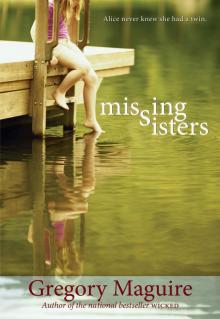 Missing Sisters
Missing Sisters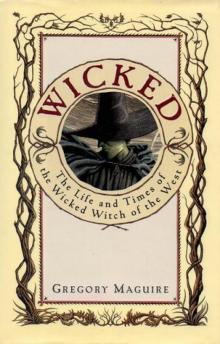 Wicked: The Life and Times of the Wicked Witch of the West
Wicked: The Life and Times of the Wicked Witch of the West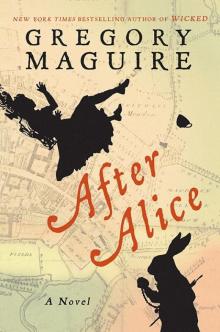 After Alice
After Alice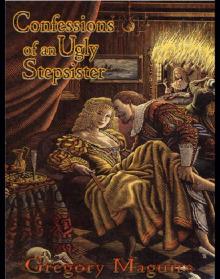 Confessions of an Ugly Stepsister
Confessions of an Ugly Stepsister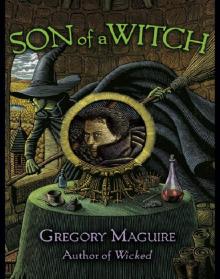 Son of a Witch
Son of a Witch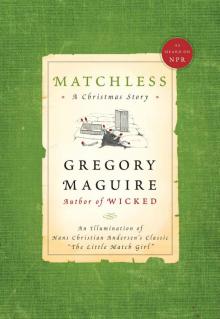 Matchless
Matchless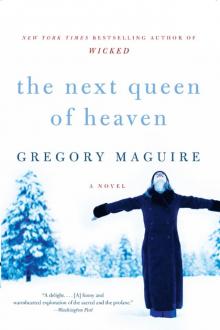 The Next Queen of Heaven
The Next Queen of Heaven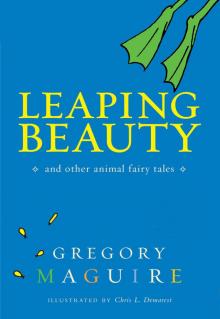 Leaping Beauty: And Other Animal Fairy Tales
Leaping Beauty: And Other Animal Fairy Tales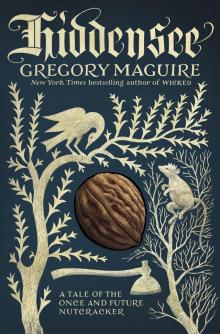 Hiddensee: A Tale of the Once and Future Nutcracker
Hiddensee: A Tale of the Once and Future Nutcracker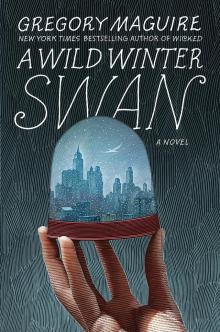 A Wild Winter Swan
A Wild Winter Swan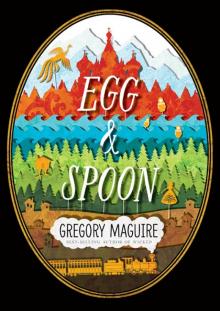 Egg & Spoon
Egg & Spoon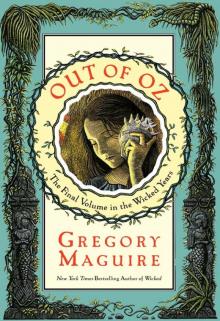 Out of Oz
Out of Oz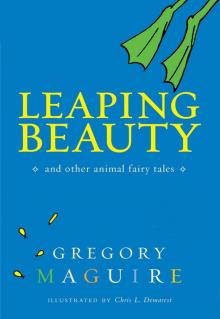 Leaping Beauty
Leaping Beauty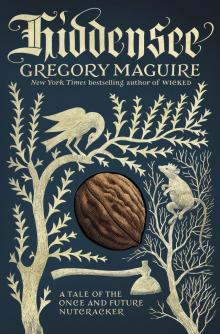 Hiddensee
Hiddensee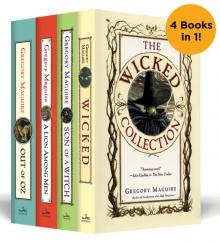 The Wicked Years Complete Collection
The Wicked Years Complete Collection The Next Queen of Heaven: A Novel
The Next Queen of Heaven: A Novel